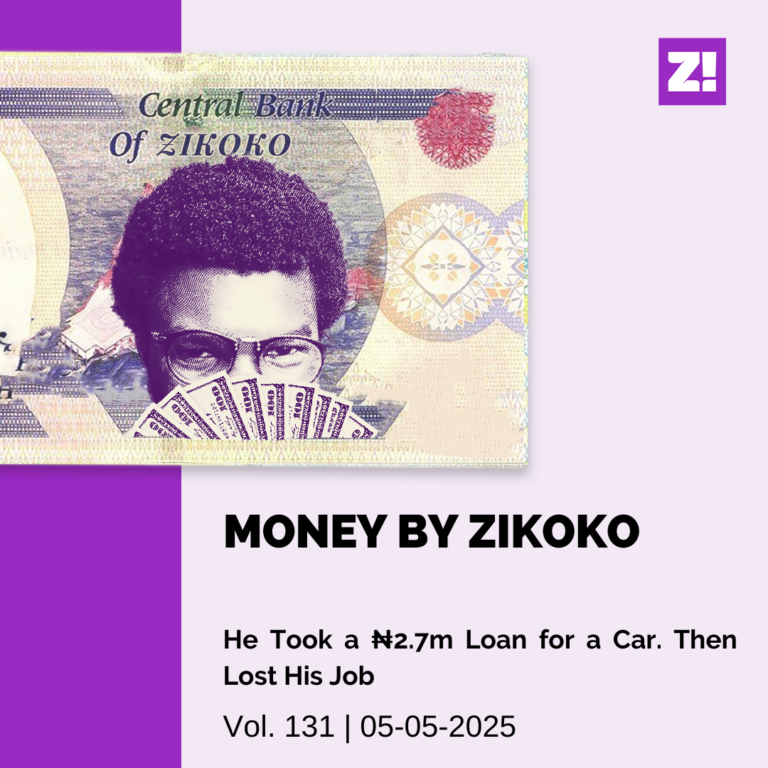On February 4, 2019, the first Naira Life went up. What had driven the creation of the series was simple — get Nigerians to open up about how they move the naira in and out of their lives, and the complexities that come with money or the lack of it.
Since the first story went up, 99 others have followed, offering new perspectives and starting conversations. These subjects and their stories have taken you, the reader, on a journey to learning, and sometimes, unlearning things about the various intersections where living in Nigeria and the naira meet.
Now, as Naira Life hits its 100th episode, we thought this might be a good time to talk to Fu’ad Lawal, who as you know, created the series and wrote these stories you’ve come to look forward to every Monday. He talks about the origin of Naira Life, his experiences with writing the series and the lessons that came with it.
When did you know you wanted to write about Nigerians’ relationship with money?
My moment came in 2016. The government had just “floated” the naira, and I had no clue what it meant. I remember asking my brother who works in finance, “Can you explain this to me like I’m 5 years old?” He did, and I wrote the explainer like I was talking to five-year-olds.
The real epiphany was realising that most of us don’t understand the jargon. Since then, I’ve been obsessed about figuring out ways to navigate money without the jargon.
What were the steps you took after this realisation?
The first thing, of course, was to find every resource that remotely explained money and was jargon-free. And the first thing is you realise that there were next to no local examples. I wrote a few articles, but nothing significant as a body of work. Until 2019.
When you started writing Naira Life. How did you figure out the structure the series would take?
I’m a shameless copycat. I knew I wanted to write about money and people, so I studied every money confessional I could find, looking for patterns. Two stood out for me: Refinery29’s Money Diaries and an Esquire interview I’d read in 2017. I liked the Esquire interview for the structure and the Money Diaries for the visual language. The structure of Naira Life evolved as I wrote and got feedback weekly.
I have a thing for firsts. Tell me about how the first Naira Life story happened.
We were toying with the idea of flagships — something that would stick out and people could look forward to. I wasn’t supposed to write it, but I got tired of waiting for it, and one Friday, I told the team I was going to send in a story on Sunday. I ran into a friend over the weekend, and we were talking about money. I was like, “Guy I want to write a story about this. Do you mind?” And he was like, “Sure.”
Cool. How did you identify subjects after then? Something you looked out for, maybe?
Even that evolved. Then, I tried to explore a perspective or income bracket I hadn’t explored before. Sometimes I succeeded, sometimes I failed. What I knew was that a story had to hit the internet every Monday at 9 a.m.
How did this affect your process? The fact that a story had to be up every Monday?
I think it’s called work.
Dead. What was your biggest challenge about writing Naira Life?
The trap of the low hanging fruit. It was easier to write about someone in my network than to go speak to a soldier at Jaji in Kaduna. Or to convince a waiter on his day off to leave his home and come have lunch with me.
The most difficult thing to navigate was trust, and it’s easier to gain trust when a person is looking at you from the other end of the table.
Trust is a delicate thing, so I’m curious to know how you navigated it. Did you go into each conversation knowing that you would gain the subject’s trust or hoping you would?
Hoping. I once spoke to an executive at a Fortune 500 company who, after an hour, told me that they couldn’t disclose how much they earned. On a very late night in the Northeast, I spoke to an evangelist who told me the hack to growing the congregation was a marketing game, not a spiritual game. He suddenly lost all sense of hearing when it was time to talk about income. I have at least a dozen of those.
Do you think these experiences are a testament to the theory that Nigerians believe that having conversations about money is “immoral”?
Framing it around morality is oversimplifying it. It’s less about morality and more about consequence, especially since we live in a tribal society. For example, when some Naira Life subjects have discussed income with their families, there was a higher tendency for their family to come and inform them when fuel finishes in the gen.
Quite often, people expect that your privilege comes with responsibilities. Many people I’d spoken to had friends that had no clue how much they earned. I find that friends in the same income bracket have no trouble discussing their income compared to financial outliers.
Speaking of income brackets, there’s a misconception that Naira Life is for rich people, how did you ensure balance in stories?
People have a bias for people with plenty of money. More people are actually struggling than balling ridiculously in Naira Life.
What are the patterns consistent with every Naira Life story?
Beyond competence, privilege and how you leverage it is the single biggest determinant of how much you earn. Part of privilege here is the background. A person whose first computer was at a cybercafe with a one hour cap is not the same as a person whose first computer was the one their parents bought them when they were kids.
Quite often, the difference between a person earning X vs another person earning 5X is the quality of information they have access to. People tend to demand more when they know people who earn more. This happens in the workplace or even amongst friends. It’s like money rituals in movies. You don’t see a ritualist going to the market to announce that he knows how to turn blood to money. They initiate a desperate friend. So, it’s quite common even in jobs where bloodletting is not involved that people start to earn more because of a friend. Sometimes, when one person earns significantly more than their friends, it’s not uncommon that they change friends.
Do you think Nigerians have anxiety about money?
Yes. It appears every single person I’ve spoken to has anxiety about money. When people have a significant income jump, they tend to blow their first big cheque on lau lau. People who have a deserter parent tend to be obsessed about providing for the people they care about, sometimes at their detriment. People who have experienced poverty tend to flee from it in every aspect of their lives. Sometimes, that even means detesting anyone and anything that threatens to take them back. Others suffer significantly from class anxiety in spaces that they know their parents will probably never enter. It’s wild in these streets.
Sometimes, these anxieties are gendered.
How?
This is not empirical, but women, more than men, tend to think about money as a tool for safety and security. It’s not uncommon to hear a woman say, “I just want to look at my bank account and smile.” Men have a greater tendency to want to “rough it”.
Also, men have more money than women, but women have a wider range of buying decisions. Men have deeper pockets while women have wider tastes. This is common knowledge.
Word. I’m curious, what’s your favourite Naira Life story?
This is hard. I’m not sure I have a favourite. I have themes that I look forward to exploring. I like stories that show people a world they didn’t previously have access to, especially when the people in these stories are the ones that they might have encountered, like service people, traders etc.
I also like stories that show other people how to make money. Because the single most important human pursuit is to increase people’s quality of life. More often than not, people’s quality of life and choices improve when they have more money.
That oil and gas engineer story was huge though. And it’s the most popular NairaLife story ever. How did writing that feel?
I knew it was going to bang — he’s rich but not doing a lot of rich people things. The things he prioritised, the things he didn’t were fascinating. I enjoyed talking to him, and navigating the complexities, said and unsaid.
What’s the future of Naira Life like?
I’d like to see more themes. More income brackets, more complexities. I believe that what Naira Life is doing is making a collage of the Nigerian financial experience. 100 episodes in, and it doesn’t even cover 10%. I want to see more perspective across age brackets, geography, faith, disciplines.
I’d also like to see more Naira Life of things. What is the cost of X? We’ve seen the Naira Life of people. I want to see the Naira Life of companies. You know, I was obsessed about doing the Naira Life of Nigeria itself, but I guess you’ll just have to wait for that.
When people want to understand how money moved in Nigeria two decades from now, you want them to come to Naira Life to understand it.
What question should I have asked but didn’t?
Haha. I’ve seen this question before. Ask me about the weight of Naira Life in my personal life.
Let’s hear it.
It’s the weight that comes with people sharing things with you that they haven’t yet shared with anyone in their own lives. And because they’ve let you in on this aspect of their lives, there’s a tendency for them to share major life updates and changes. The handyman from last year has told me about two job changes. I ran into a subject with a saving addiction a few weeks ago, and we spent about 20 minutes talking about how much has changed since the last Naira Life.
The greatest privilege of writing Naira Life is not the things that made it into the final edit but the things that didn’t.
I also enjoy hearing the occasional, “I feel better talking about this, thank you.” Glad I could help.
On a scale of 1-10, how much did you enjoy writing Naira Life?
Hahaha. 14. The range of my perspective expanded beyond measure and changed my life forever. I don tear the scale mehn!
Lmao. This one is for the people. What’s your oldest memory of money?
This story is gross. It was a rainy school day in Primary 3. I always showed up to school ridiculously early or ridiculously late. It’s what happens when you live in Ikorodu and go to school in Surulere. My parents had just dropped me off at school early in the morning, but the journey from the car to my class was enough to get me wet. I also needed to take a quick shit, so I ran straight to the class toilet.
For some reason, I thought the paper in my pocket was tissue. I was as absent-minded then as I am now, and hearing the paper rip apart was when I looked down at my hands. I saw the disappointed face of Murtala looking up at me. My ₦20 spending money was destroyed.
That money could buy me five pieces of coconut candy, one toy soldier and enough change for the beggar at my school junction.
Eww. Thank you, Fu’ad. This was fun.
Lmao. Thank you.




